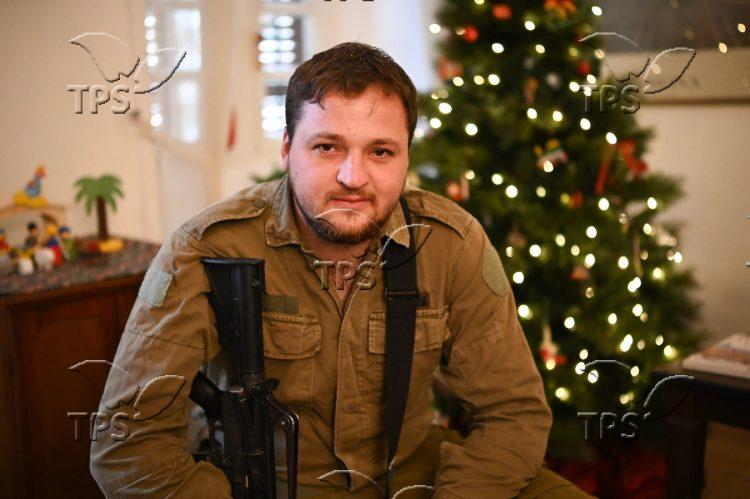Christmas in Wartime: An Israeli Christian Soldier’s Story
Jerusalem, 24 December, 2023 (TPS) -- Despite the country being at war, one Christian soldier on Christmas leave said the holiday will still go on. It’s just slimmed down from a holiday “season” to Christmas itself.
“For me, the defining difference will be the length of celebration, from a Christmas season down to a couple days. I’ll be celebrating with my family — my wife, my two small children, and my parents. We’ll attend a prayer service, give gifts, have a nice breakfast, that’s what usually happens on the 24th and 25th,” Staff Sgt. Benjamin, who serves in reserve infantry unit for the Israel Defense Forces, told the Tazpit Press Service.
“But the surrounding festivities, the parties with friends and taking time off work, that won’t happen this year,” he added.
The 28 year-old Benjamin was home in Jerusalem for a two-day Christmas leave. TPS cannot disclose his family name. As soon as Christmas is over, he will return to his unit in Eilat doing routine security along the city’s border with Egypt. When he’s not serving in the IDF’s Givati Brigade, Benjamin does media and fundraising work for the Israel Trust of the Anglican Church, a non-profit organization based in Jerusalem.
“In Christian neighborhoods , you usually see decorations, markets, parades and stuff like that. There’s a dampening of that. But on a personal level, despite the external circumstances which are dark and tragic, I think some of the messages of the holiday are very important. The joy and the light is doubly important. Now more than ever we need to find that light and joy,” he said.
Israel’s Christian population grew 1.3% in 2023, according to figures released by the Central Bureau of Statistics on Thursday, ahead of the Christmas holiday.
According to the data, 187,900 currently live in Israel, making up 1.9% of the country’s population.
Demographic studies have found that Israel is the only country in the Middle East with a growing Christian population.
When asked what it’s like to be a Christian in the IDF, Benjamin says its “normal,” despite being a minority.
“For a Christian who goes into the IDF, the experience is more like everyone else’s than different. It’s quite a normal experience. You go in and after two weeks, you’re a soldier just like everyone else,” Benjamin said. “I think the most important dynamic is the army’s ability to bring about that equality between everyone, whether you’re Jewish, Christian, Druze, etc. The most important element of being in the army is that you’re a soldier.”
He added, “There are elements that remind you of separateness, but more importantly and more powerfully, there’s something very unifying about being in the army and that’s the shared experience. That’s the most important part, especially when you’re in a combat unit.”
An Unlikely Path to the Army
Benjamin’s unlikely path to military service actually started in Mexico.
His parents came to Israel from the US in the 1970s. Benjamin explained that they only planned to stay for a year or two, but “one thing led to another.” The IDF doesn’t recruit temporary residents and Benjamin finished high school without any intention of enlisting.
“So I went abroad on a charity program helping build houses outside Tijuana, Mexico.” That was in 2014, and while away, Hamas terrorists kidnapped three teenage boys, triggering a war in Gaza.
“I was the only person from Israel and I was constantly bombarded with all sorts of questions,” Benjamin recalled. At a certain point, he said, “It felt a little hypocritical of me to advocate for the ground war while my friends were serving and I wasn’t. I wanted to put my money where my mouth was.”
Benjamin returned to Israel, but instead of fighting terrorists, he instead spent six months battling the bureaucracy to enlist. The army wouldn’t recruit him until the Interior Ministry gave him permanent resident status. But the ministry said it wouldn’t give him that status until he served in the IDF.
After countless letters and phone calls, the head of ministry’s Population Authority signed off on the permanent residency status and Benjamin enlisted at the age of 20.
Israel’s Melting Pot
Military service is mandatory in Israel, making the army a social melting pot. Benjamin says this includes Christians and other minorities too, and notes that the melting pot is a two-way dynamic.
On one hand, “I’ve met people from across the spectrum of Israeli society, whether it’s socially, geographically, politically or ethnically. I’ve met and bonded with people I probably never would have had it not been for my army service. That’s special and quite important,” Benjamin stressed, helping him better integrate into society.
On the other hand, soldiers are exposed to Benjamin too.
“I tend to be the first and only Christian that people have met. That’s also a very interesting dynamic. People ask me lots of questions, ‘Who are you? What are you? How are you? What do you believe?’ Sometimes, it feels like a weighty responsibility because I’m representing a whole world view, a whole group of people. But it’s also a privilege to be somewhat of an ambassador.”
Benjamin told TPS he’s shocked by the wave of antisemitism spreading around the world since October 7. At least 1,200 people were killed in Hamas’s attacks on Israeli communities near the Gaza border on Oct. 7. The number of men, women, children, soldiers and foreigners held captive in Gaza by Hamas is now believed to be 129.
“As a non-Jew, my message would be, as someone serving in the IDF — and especially to Christians — the duty and the importance of combating antisemitism wherever you are, whether its in your local community or online,” Benjamin said.
“I think everyone has a moral duty, especially Christians, given the centrality of the land to their own worldview, to combat antisemitism. Especially in the light of Christmas. There are plenty of connections one could make. My message would be not to stand down, not to be ashamed, and to call out antisemitism where they see it, when they see it.”
One way the war has changed Benjamin is that since October 7, he’s not only been an unofficial Christian ambassabor to his army infantry unit, he has also become an Israeli ambassador of sorts to many Christians around the world.
“The land of Israel is very central to Christian faith and way of life. So there are fairly well-developed connections between Christians globally and Christians in the land. The amount of attention on this conflict is massive,” he explained.
“I’ve had dozens of people writing me on WhatsApp, friends I haven’t spoken to in years, friends, people from Mexico, friends of friends, family, wanting my opinion about things in the news,” he said. Some are supportive, some are critical. It’s an interesting, challenging and honoring experience to do that. I think that’s most defining feature of this time.







